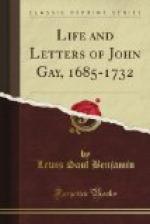Waller in Granville lives; when Mira sings
With Waller’s hands he strikes the
sounding strings.
With sprightly turns his noble genius
shines,
And manly sense adorns his easy lines.
On Addison’s sweet
lays attention waits,
And silence guards the place while he
repeats;
His muse alike on ev’ry subject
charms,
Whether she paints the god of love, or
arms:
In him pathetic Ovid sings again,
And Homer’s “Iliad”
shines in his “Campaign.”
Whenever Garth shall raise his sprightly
song,
Sense flows in easy numbers from his tongue;
Great Phoebus in his learned son we see,
Alike in physic, as in poetry.
When Pope’s harmonious muse with pleasure roves, Amidst the plains, the murm’ring streams and groves. Attentive Echo, pleased to hear his songs, Thro’ the glad shade each warbling note prolongs; His various numbers charm our ravish’d ears, } His steady judgment far out-shoots his years, } And early in the youth the god appears. }
It was in reference to these complimentary lines (which Pope saw in manuscript) that, on December 21st, 1711, Pope wrote to Cromwell: “I will willingly return Mr. Gay my thanks for the favour of his poem, and in particular for his kind mention of me."[14] That letter is interesting also as being the last exchanged between Pope and his old friend; and it is instructive, as showing how the acquaintance between the poets was already ripening, that Pope turned to Gay in his distress at the defection of his earlier friend. “Our friend, Mr. Cromwell, too, has been silent all this year. I believe he has been displeased at some or other of my freedoms, which I very innocently take, and most with those I think my friends,” he wrote to Gay on November 13th, 1712. “But this I know nothing of; perhaps he may have opened to you, and if I know you right, you are of a temper to cement friendships, and not to divide them. I really very much love Mr. Cromwell, and have a true affection for yourself, which, if I had any interest in the world, or power with those who have, I should not be long without manifesting to you."[15]
If Pope had lost the friendship of Henry Cromwell, he was certainly anxious to strengthen the bond that was beginning to be forged between himself and Gay, to whom he wrote again: “I desire you will not, either out of modesty, or a vicious distrust of another’s value for you—those two eternal foes to merit—imagine that your letters and conversation are not always welcome to me. There is no man more entirely fond of good-nature or ingenuity than myself, and I have seen too much of these qualities in Mr. Gay to be anything less than his most affectionate friend and real servant."[16] That the intimacy between the poets waxed apace is evident, for when Pope wrote “A Farewell to London in the year 1715,” the concluding stanza was:—
Adieu to all but Gay alone.
Whose soul, sincere
and free.
Loves all mankind, but flatters none.
And so may starve with
me.




